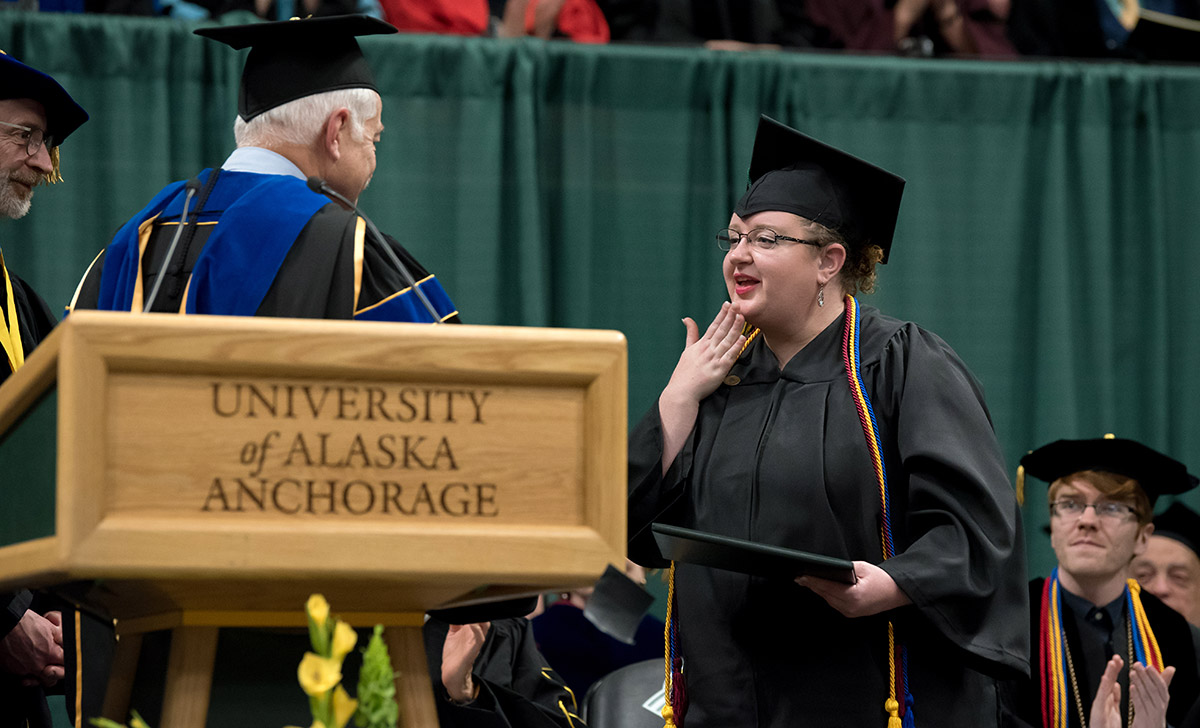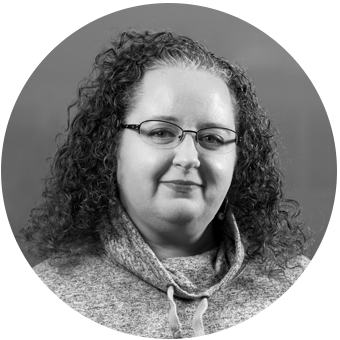
Breaking Down Barriers
magine yourself sitting in the audience at the University of Alaska Anchorage (UAA) Fall Commencement ceremony of 2018. Five hundred students have finished their hard work and are getting their degrees, ready to start a new chapter of their lives. Every one of them has their own unique story to tell.
On the stage sits a student who has been selected to give an inspiring speech to the audience about their future. She looks like every other student, excited, robed in black with a cap on her head, the tassel waiting to move over to the other side. Like so many others, she started this journey unsure what she wanted to do, unsure what her destiny would be after college. She had considered many choices and had made many decisions during her four years of college, learning new things, earning excellent grades and finding her role on campus.
When it is her turn to give her speech of inspiration, she steps up to the podium.
It is not her voice that fills the room. It is the voice of another woman standing off the stage, watching as the student’s hands fly with a fluency that she has had since birth.
She is Deaf.
“One day at a time,” the student advises as her hands dance almost lyrically in the air. She tells of her experience in college, of both challenges and wonderful moments, of how she drew inspiration from several people as she worked on fulfilling her lifelong dream of earning a bachelor’s degree. Her greatest inspiration came from her 14-year-old son, of whom she said, “My success is his success.” She then outlined the five tenants of the Journalism Code of Ethics and how they applied not only to journalism students but to everyone graduating: “Go out there with integrity, be truthful, fair, independent and accountable for the people. This code is important to the journalist, but we all should live by it.”
The audience waves their hands in the air as if making “jazz hands,” the Deaf sign for applause. She beams as she returns to her chair, proud that she is able to represent not only the Deaf culture but everyone who has experience with a disability. She isn’t the first deaf person to attend and graduate from UAA, but she has made history as UAA’s first deaf commencement speaker.
That person was me.
In the whirlwind of my final semester of college, I was juggling several things at once: wrapping up my Journalism and Public Communication major with my last five classes, working for UAA Disability Support Services (DSS) as a student worker, and taking care of my 14-year-old son, the pride and joy of my life.
According to UAA, I left behind a legacy.
This legacy was a project I completed for my Independent Study course in partnership with DSS. As a student working in the DSS office, greeting students and doing my job, I learned so much about the slogan “Don’t ‘Dis’ my Ability” and my role in representing that slogan on campus. At the same time, as a student with a disability (not that I ever considered my Deafness a disability), I faced some issues on campus and decided to use my independent study to contribute to improving the experience of students with disabilities.
I launched two surveys for DSS, one for the faculty and staff and another for the students. The surveys queried their experience with DSS, accessibility and their overall satisfaction with its services. The surveys requested their feedback, as well. The last survey initiated by DSS in 2011 was sent only to students, with vague and limited results. Based on this, I expected few responses.
Within the first 24 hours, the responses were overwhelming. More than 150 students and 300 faculty and staff responded. It was staggering, and I was over the moon about the survey’s success. I read through the results and realized that while the students’ responses were from the UAA campus, the faculty and staff included the other campuses under UAA, as well. The results gave me a better picture of what students, faculty and staff wanted from DSS.
UAA’s stated 2020 values are student success, excellence, access and affordability. Its 2020 goals include advancing a culture of institutional excellence that inspires and enables student, faculty and staff success; more students persisting and completing their educational purposes; and graduating more students to fill Alaska’s needs.
To help UAA fulfill its 2020 values and goals, we also need to consider students with disabilities. According to the 2011 National Center for Education Statistics’ “First Look” report, 11 percent of all college students across the nation self-identify as experiencing disabilities (Aug. 2018). The number may be small, but it potentially has a profound impact in the long run. The number of people with a disability increases exponentially every few decades. If we don’t do something now, it will become a struggle several decades in the future. Students with disabilities are more likely to drop out of college for several reasons: they lack access to courses, they struggle to understand the courses, or they can’t afford to complete college. Life with disabilities can get expensive, and with limited college experience, they cannot live life to the fullest, a life lived without barriers.

I’ve faced multiple barriers and stigmas due to my deafness. This does not mean I regret being Deaf. I love it. It is who I am, it’s normal for me, and I would never ask for anything different. However, I need the world to be more understanding and accessible, not just for me but for everyone.
With the result of this survey, DSS now knows what it needs to do to improve its student services and help faculty and staff to succeed in UAA’s 2020 goals of retaining their students and providing full accessibility. It is a step forward in breaking down the barrier for students experiencing disabilities.
Standing up on the stage giving my commencement speech, I knew I was not finished. I took a step forward, taking what I learned from my experience, and now my path lies clear before me. I know what road I will be taking, embracing my destiny to help others with disabilities, making life fully accessible.
